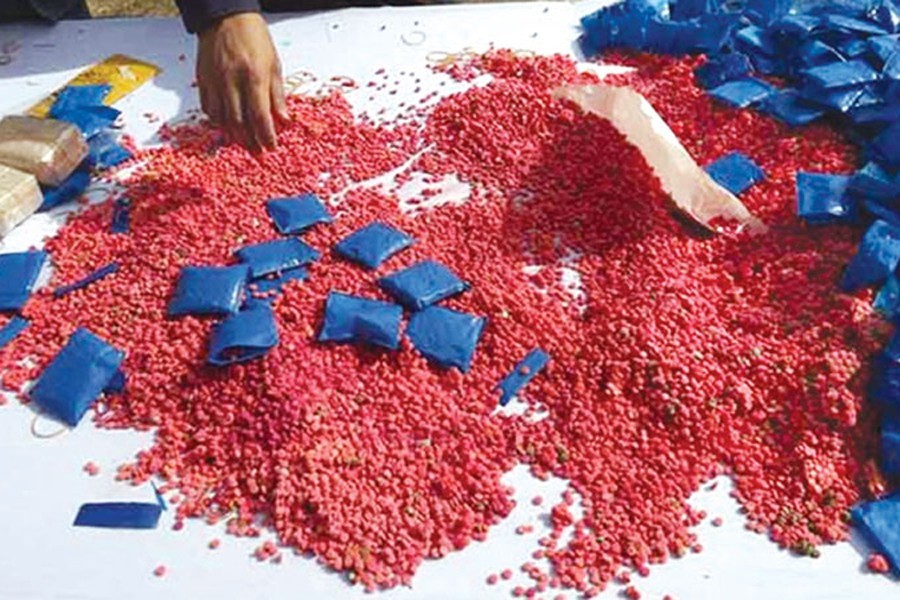Detection of a suspected route of Yaba smuggling through the north-eastern Indian states is highly disconcerting. The new smuggling route brings to the fore the veritable unassailability of the scourge. Thus Bangladesh can now be considered a country under a 'state of siege' prompted by the yaba menace. The range and scope of the regional Yaba network are evidently widening. It branches out from its source in Myanmar's Shan state. A couple of months ago, an alternative drug route using Teknaf-Kuakata-Dhaka baffled the authorities concerned. Dropping the conventional Teknaf (Cox's Bazar)-Chittagong-Dhaka route due to law enforcers' strict checking measures, some smugglers picked this route across the Bay of Bengal. Thanks to the country's porous border with north-eastern India and some areas in Myanmar, the fear of other undetected smuggling routes looms menacingly.
The ongoing anti-yaba drive across the country began with a noble mission --- uprooting the drug menace. Outwardly the intensity of the 2-month-long operation is impressive. It struck fear into the heart of drug users, peddlers, smugglers and local syndicates. The apparently inescapable dragnet across the country has seen a remarkable decline in the use and supply of Yaba tablets. In the drug-related raids 22,000 people have reportedly been arrested, and more than 150 suspected smugglers killed in 'crossfires'. But it's an irony that the swoops conducted by the striking and law enforcement personnel have yet to hunt down and nab the Yaba godfathers. The forces are said to be in possession of a list of 5-6 drug mafia dons based in Cox's Bazar. It is incredible that they are still on the loose. These godfathers call the shots over 50-60 per cent of Yaba smuggling into the country. They are said to be operating their trade in cahoots with their counterparts in Myanmar --- 14 Shan separatist groups. The drugs are said to be entering Bangladesh all the way from the factories in the Shan-controlled zones.
As part of the normal process, the Myanmar government is expected to block the smuggling passage. The reasons why it is not doing so are not far to seek. According to law enforcement sources, 500 Rohingya Yaba smugglers have crossed into the country in the weeks after the start of the refugee exodus from Myanmar in late August last year.
Taken as a whole, this drug poses a dreadful threat to the nation. It has already emerged as a potent agent of social and moral avalanches ending up in the destruction of a whole generation. The nation can ill afford to remain content with an anti-drug drive which seems faltering at times. A worrying aspect of the ongoing countrywide operation is that even the law enforcers are outwitted by the drug syndicates. It highlights two things: the drug smugglers and suppliers are formidably powerful; and the raids have some limitations. Both of these impediments ought to be addressed in right earnest. Moreover, alongside conducting foolproof and effective drives, the problem has to be kept in a broad perspective. The imperatives of strong advocacy at family, community and social levels and aggressive anti-drug campaigns warrant inclusion in the law enforcers' operations. A drastic fall in demand can work wonders.


